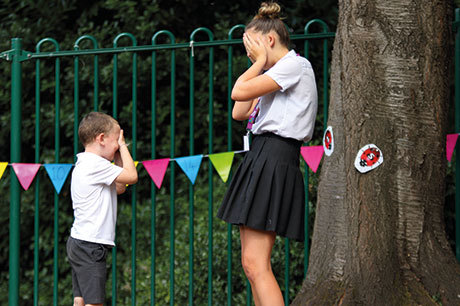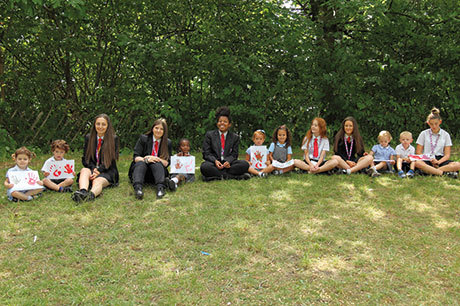
Download the PDF of this article
Early years children are being mentored by secondary school pupils in a national programme which has been found to be mutually beneficial to both age groups.
Improved self-esteem and attainment are just two of the outcomes of Teens and Toddlers, delivered by youth development charity Power2. The programme aims to inspire young people to succeed at school and create a brighter future for themselves and for others by pairing them with children in local day nurseries and nursery classes who may need additional support or just someone to look up to.
The groups of around eight teenagers give their assigned nursery children one-to-one attention and act as their role model and mentor for half a day a week during the 16-week programme, led and supervised by trained programme facilitators.
The concept of older children mentoring younger ones was brought over from the USA and trialled in Bermondsey, South East London in 2001. Now it runs in areas of deprivation throughout the capital and in the North West of England, North Yorkshire, Surrey and the West Midlands.
Young people, aged 13 to 16 years old, are approached to join the programme if they are identified as at risk of not achieving their academic potential because of issues including poor behaviour, disengagement from school and low self-esteem.
‘The relationship between the teens and young children is very powerful,’ says Power2 chief executive Joanne Hay. ‘There is an incredibly low drop-out rate because there is something compelling about being a mentor to a small child. The teens know we believe and trust that they can do it and know that they are being given the responsibility. They experience what it is like to be looked up to and to contribute to someone else’s outcomes and success.’
She adds, ‘We get great feedback from nursery staff saying how they love having us in so that there is concentrated support for the young children who need extra help.’
PURPOSE AND RESPECT
Before going into early years settings, the mentors have sessions on how to behave around the children and child development. ‘This is really important because it helps the young people to relate to the toddlers and also to reflect on themselves,’ says Ms Hay.
The sessions then follow a similar format each week with the teenagers being escorted to the local nursery by a programme lead who chats to them, checks everyone is in the right frame of mind to go into the nursery and discusses the focus of the session.
The mentors will then spend around 90 minutes engaging with their allocated child under supervision. They may be having fun outdoors or with role play, supporting them with arts and crafts or a focused activity suggested by the nursery team.
This is followed by classroom time for the mentors where the programme leads give feedback and mentors share their experiences and think about their own behaviour. They also do journal work to support their reflection and writing skills.
Dawn Kendall, a programme lead in Hackney, East London, says she tries to get the mentors to look at the positive impact of their actions in order to empower them.
‘We discuss the highlights, for example that Tommy was able to write his name, and I may ask how that emerged and it could be because the mentor helped him to hold a pen,’ she explains. ‘I try to get them to look at what they did, which helps them to build their own self-esteem. They are able to make things happen and have a purpose.’
Teens and Toddlers graduate, 13-year-old Mark looked forward to the sessions and enjoyed giving the children someone to look up to. ‘I think I’ve changed quite a lot. I’ve got responsibilities and I’ve got to look after the kids’ safety. I feel like they respect me,’ he says.
INTERACTION AND REFLECTION
Children and young people gain in many ways from their participation on the programme (see box). Often they are matched so the mentor and mentee learn new skills together.
‘The nursery children gain a companion. The children don’t necessarily have friendships in their peer group and this is about helping them to build confidence and to make friends. The mentor will play with them and then other children will often want to join in. The children are able to develop their self-confidence through exploring, playing and discussion with their mentor. They grow to look up to the young adult,’ says Ms Kendall.
She recalls a teenager who was reluctant to speak but through interaction with her mentee developed the confidence to read to them and ‘found her voice’. In return, her mentee improved their social skills.
A disruptive teenager learned to appreciate how demanding a teacher’s role is, especially if a child is not listening. By the end of the programme, he wanted to train to be a teacher himself. Ms Kendall believes the programme gets great results because it is based on hands-on activities, interaction, reflection and discussion.
‘The child is getting one-to-one attention which feels special and they will often look forward to seeing their mentor, which is why we require a lot of dedication from the mentors,’ she says.
‘The young people understand that the child will be disappointed if they don’t turn up. The mentor learns that what they do matters, which helps them to develop their independence and self-esteem. It’s a win-win situation.’
CASE STUDY: Divine Mercy Primary School, Manchester

‘We aim to be a forward-thinking school involved in programmes that will add impact to our children who speak over 40 different languages and the majority of them come from disadvantaged socio-economic backgrounds,’ explains Sean Mitchell, early years leader at Divine Mercy Primary School in Moss Side, Manchester.
‘We were approached by Teens and Toddlers in 2014 via a local high school and we weighed up the benefits, drawbacks and costs. The drain on staff time concerned us but the programme is led by professionals so the impact on staff is minimal.
‘Moss Side is a lively and diverse place which has been regenerated in recent years in an attempt to leave its past behind. Its population has been growing – up 30 per cent since the 2011 census, and this is made up mostly of young families who have many challenges to overcome both socially and economically. Some of our children don’t have positive role models.
‘By bringing in teens to play with the early years children we’re enabling them to see young adults as fun, interested and kind, which they benefit from and also learn new skills.
‘Three- and four-year-olds are brutally honest and can’t hide their smiles and hugs when their mentors visit. It’s also good to see how the teens can be transformed from nervous or nonplussed to confident and engaged.
‘Simple things like reading books together, having someone who is interested in what they say, showing them how to build with blocks properly or playing in the sand together helps to make the children – who may only experience computers and TV at home – happy, settled, engaged and able to learn. We feel we’re putting back into the community by helping young adults to achieve, but in return they are helping our early years children and we can see real benefits.’
PROGRAMME IMPACT
- The level of communication and language skills shown by toddlers participating in Teens and Toddlers improved by four times.
- 75 per cent of teachers agreed that the teenager’s contact had a positive effect on the toddler’s confidence.
- 83 per cent of teachers agreed that the teenager’s contact increased the likelihood of the toddler engaging in active play with other children.
Results from Humphrey K and Olivier A (2014). ‘Investigating the impact of teenage mentors on pre-school children’s development: A comparison using control groups’, Children and Youth Services Review, Volume 44, pp20-24
- 92 per cent of teachers said the young person benefited from the Teens and Toddlers programme.
- 83 per cent of young people said the Teens and Toddlers programme helped them to decide their goals and plans for the future.
- 73 per cent of young people said the Teens and Toddlers programme left them feeling like a person of worth, at least equal with others.
Results from Power2 reporting. Full results available at www.power2.org/impact









